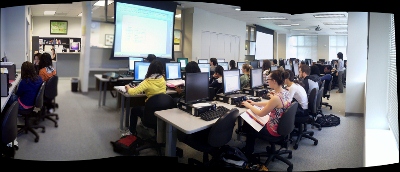Archive
“"Mira, mamá! Sin manos!". Can speech recognition tools be soundly applied for L2 speaking practice?” FLEAT VI, August 11-15 at Harvard University
Sample learner speech recognition speaking practice task assignments and screencast completions
- My initial test of W7ASR mV8MRY used an end-of-chapter web quest from a 1st-year German textbook. From reading for the gist to pronouncing an authentic target culture text is a challenge – make it extra credit.
- Turn existing writing exercises into speaking/ reading/ corrective writing exercises: Free form writing during note taking, e.g. when answering comprehension or short essay questions, fits the continuous speech optimization of W7ASR.
- You will likely see reduced recognition accuracy and less proofing feedback, but gain wider applicability for (grammar, but especially vocabulary) drills that use discrete writing, e.g. filling in cloze exercises (navigation need not be done by voice), even in a web browser from your LMS or online textbook.
- Turn “flipped classroom” homework preparation fill-in-the-blank conversation suggestions into more hands-on phrase dictations before your in-class communicative practice.
- Similarly, my Spanish screencasts, e.g. qK9fKV, flips our Spanish for Law Enforcement: If W7ASR can ”understand” your Miranda warning, a suspect likely can also.
- Finally, the most advanced language learners can replace writing of essay tasks from their textbooks by speaking them – use of only ASR for editing is optional.
- All above tasks are based on existing textbook and/or syllabus which are easily extended by Windows 7 “open response” speech recognition.
Calendaring can improve instruction
It’s coming: “An Interactive On-line Course Calendar for Multi-Section Courses, by María Paredes Fernández (University of Pennsylvania): The interactive online course calendar was project that received funding from the Penn Language Center at the University of Pennsylvania in early 2012 to streamline class preparation for fellow colleagues, promote transparency for the students, and ensure continuity and quality instruction of the Accelerated Elementary Spanish Course, Spanish 121. The day’s lesson plans organized and uploaded on an interactive webpage on the course management systems Blackboard and Canvas. The lesson plans were comprehensive, as it featured the links, PDF documents and PowerPoint presentations of the day in one convenient location, and were easily shared with students to aid in their preparation. This talk will focus on how the interactive syllabus shaped this course and how it could work for other programs.”
Moodle can ICS exporting, which students and teaches can subscribe to in their NINERMAIL.
Looking forward to the Digital Humanities Unconference at UNC Charlotte
- Why I come to THATCamp Piedmont:
- I am looking for practitioners of NLP in a language and literature teaching context since I am working on Using NLP tools to automate production and correction of interactive learning material (presented at Calico 2012)
- for the Learning Exercise Creation Engines (presented at EUROCALL 2007) I developed.
- A little about myself:
- My Ph.D. thesis expanded the close reading of textual variants in the German editorial schools of Hans Zäch and the use of the computer-generated textual concordances in the interpretation and selection of textual variants into a corpus linguistic-inspired approach, that traced Leitmotifs in the work (partially first digitized by myself) of the foremost Swiss-German classic as a digital corpus using Regular Expressions programming.
- I have since applied my corpus linguistic approach to
- the use of machine translation software
- the automation of learning material creation (glossing, question generation, differentiation) on the basis of natural language processing of textual (film subtitles, news) corpora.

 here
here
